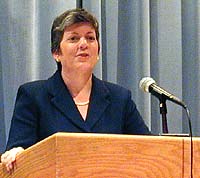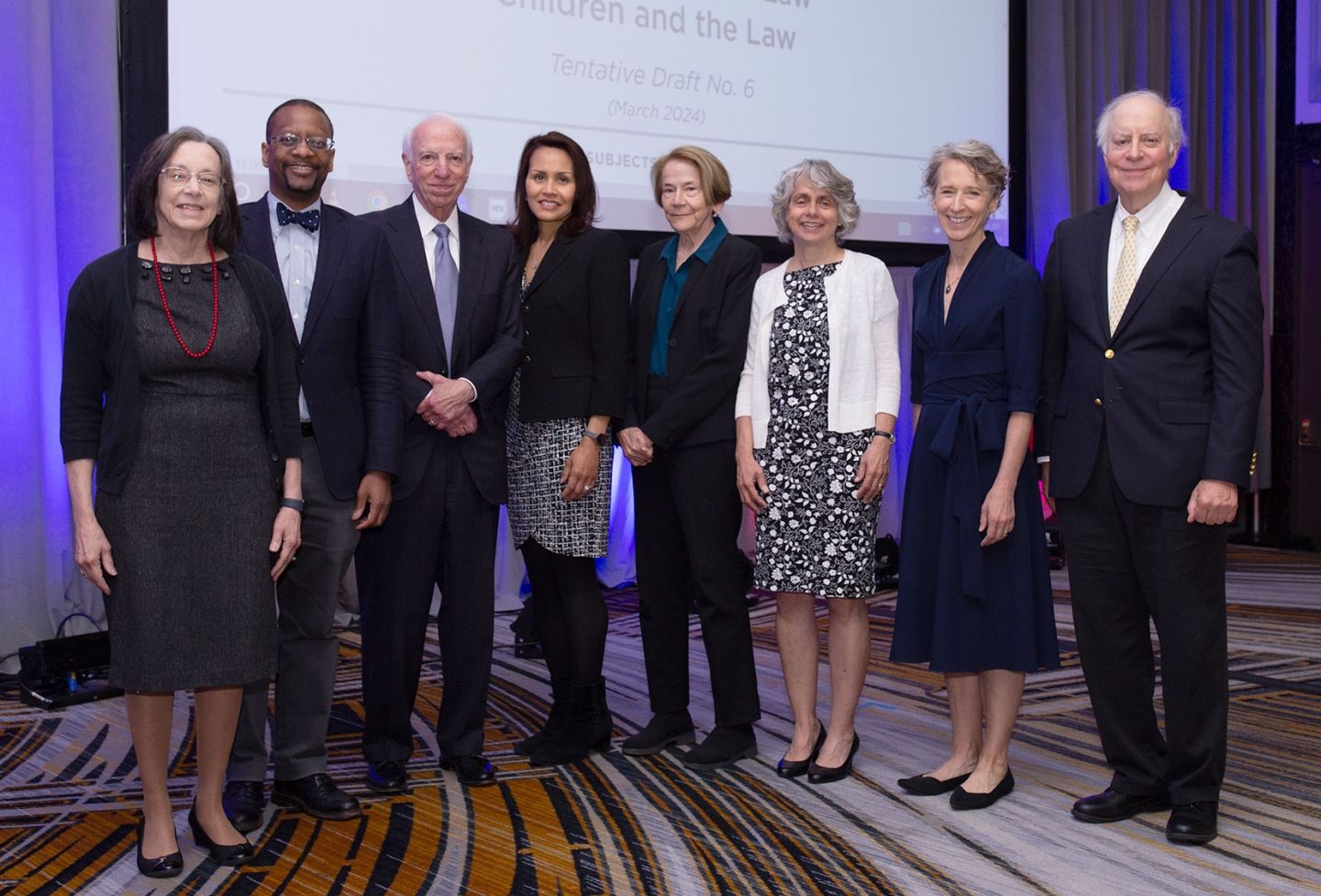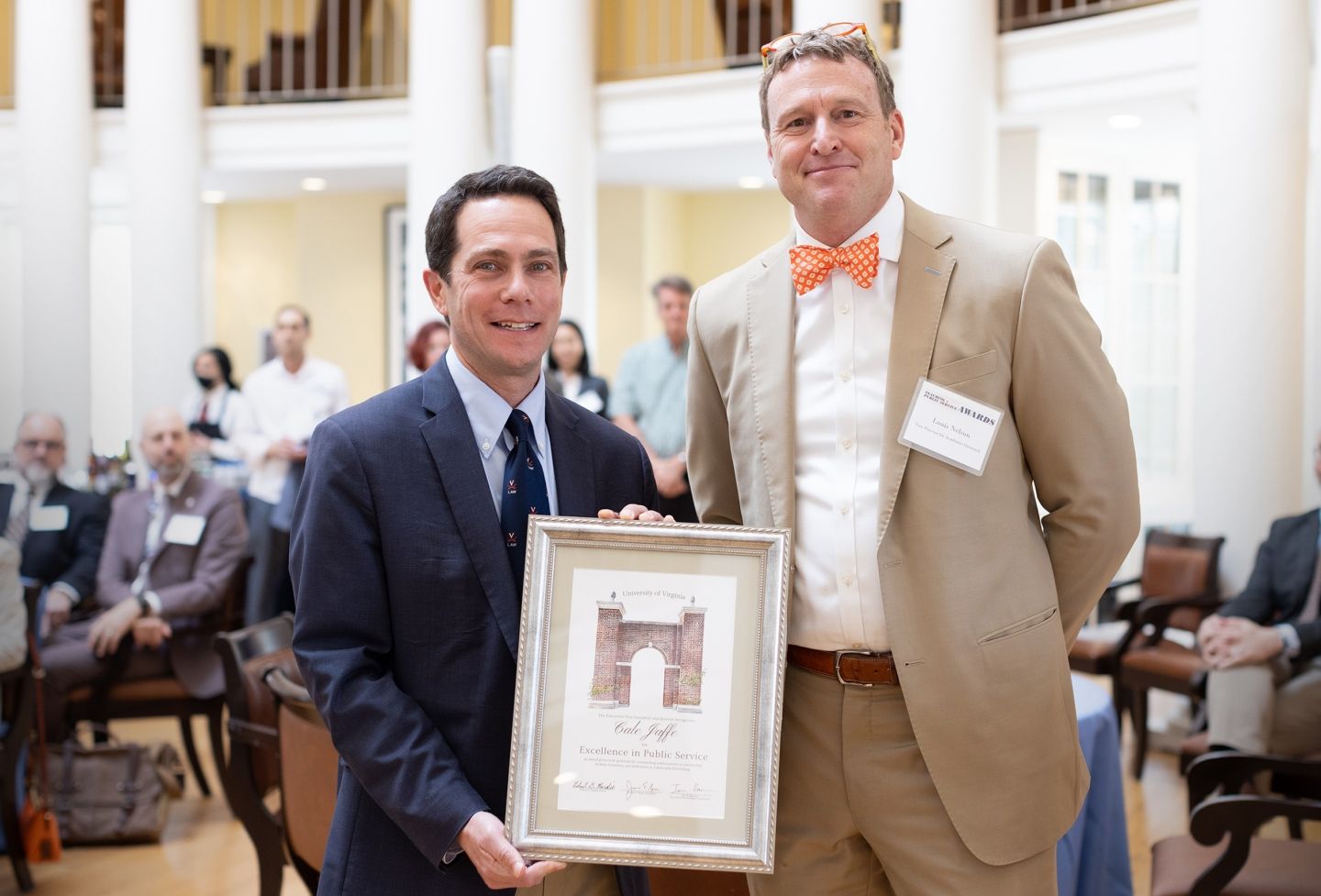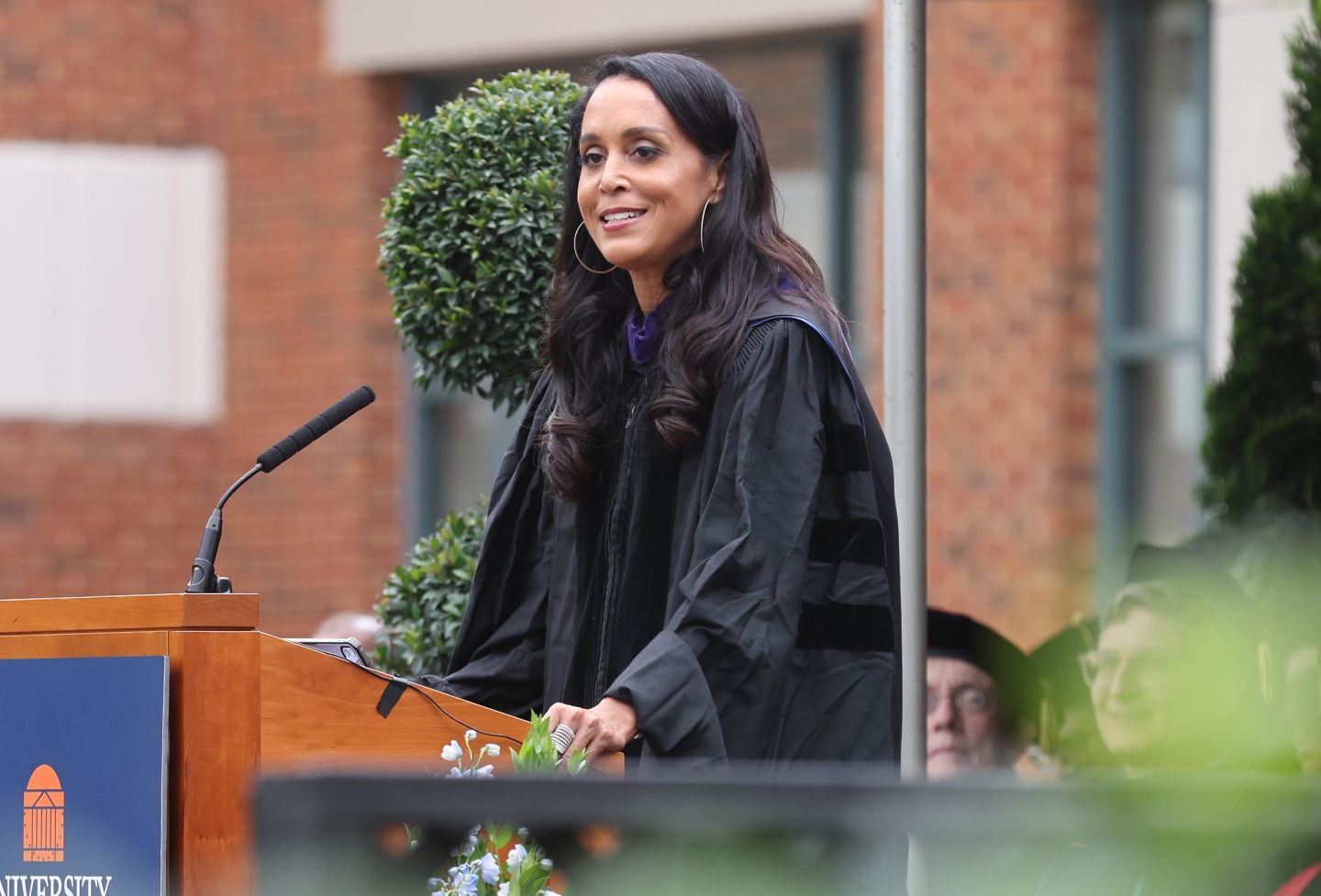Napolitano Encourages Balance of Private, Public Practice

After graduating from the Law School in 1983, Janet Napolitano packed everything she owned into her two-door Honda and puttered out to Arizona in the August heat. She may not have known it then, but she was heading for her future as well. Now governor of Arizona, the first woman to succeed another woman as governor in the country, Napolitano looked back on her wending path through private and public law during the Conference on Public Service and the Law's keynote address March 15.
Working as a judge's clerk, in private practice, as a U.S. Attorney and as Arizona's attorney general, Napolitano said, "has prepared me to take on what is probably the most challenging job in government now."
Her grounding began in law school, she said, noting that she and her law school housemate were later both U.S. Attorneys at the same time, and former Gov. Evan Bayh, now a U.S. senator, was a student in the class two years ahead of hers. "There's a rich tradition here of public service."
"We would like to say we made Janet Napolitano, but the truth is she made herself," former dean and law professor Richard Merrill said in his introduction. "She is the epitome of what it means to be a public servant as a lawyer."
A New Mexico native, Napolitano chose to clerk for a U.S. Appeals Court judge in Arizona after law school. Being a clerk "is a wonderful way to bridge from the law school to practice," she said, and Arizona was a place where "opportunities would abound." After her clerkship she joined the Phoenix firm Lewis and Roca, where she began to understand how to combine private practice with public service.
Senior firm partner John P. Frank of Miranda fame offered her a model; throughout his career he took pro bono cases. "He would go once a month and spend a night at the legal aid office in Phoenix," she said, and he worked into his 80s.
"That taught me something about how you could combine public service with private practice," she said.
While working at the firm Napolitano also got involved in politics. She volunteered to be the lawyer for the Democratic Party — "Don't do that," she joked — and cast the Arizona votes for the Democratic presidential nominee in 1992 in English, Spanish and Navajo, reflecting the state's three prominent languages.
Soon after, President Clinton appointed her U.S. Attorney for the District of Arizona. She had no criminal law experience, and had to catch up quickly.
"It was no doubt a transition, but it was not as hard as I thought it was going to be."
She said the experience made her appreciate public sector lawyers who work full-time. Much of the work involved drug trafficking and immigration violations, but also the savings and loan scandals and corruption cases. During her watch she oversaw the investigation into Timothy McVeigh's activities in Arizona prior to the Oklahoma bombing. She noted that Kingman, AZ was the site of the tenth-largest FBI office in the world for six weeks during that time.
When Arizona's attorney general seat opened up, Napolitano said to herself, "If I don't run now I'll probably never run." She called her dad to tell him she would be campaigning without a salary for a year. "Let me get this straight," he began, before listing her dwindling salaries since her top salary at Lewis and Roca. She fired back that she knew he's got that trust fund money waiting for her. A few days later she received a check made out to her campaign for $5 from the "Napolitano Trust Fund," with the note, "exhaustion of principle and interest."
In 1998 Napolitano was the only democrat elected in Arizona, a predominantly Republican state that nonetheless was and is undergoing rapid demographic and population changes partly due to increasing numbers of Hispanics. As attorney general she was also part of the "Fab Five"-five women who held the five highest elected offices in Arizona in what was a first for the country. While the U.S. Attorney's office was 95 percent criminal law work, the attorney general worked within a more broadly based political context.
"It enables you to do good things as you litigate," she said. For example, Napolitano sued shoe manufacturers for price fixing, and the awarded damages went to programs affecting women. "With that settlement we were able to keep women's shelters open and add beds," she said.
Arizona also joined other states in an antitrust suit against bulk vitamins producers, garnering millions used for nutrition-related programs, including buying dentures for senior citizens on Medicare, which doesn't cover the expense. By the time she finished her term, Napolitano said, she had argued cases in virtually every federal circuit court in the country, the Supreme Court, and The Hague.
"That's something that in public service you have the opportunity to do," she said. "Always go for an open seat."
Although voters were used to thinking of Napolitano in leadership positions, she also had to work hard to raise funds in her campaign for governor. She ran under Arizona's "Clean Elections" regulations, which helped provide her with some matching funds, and thanks to a campaign fundraiser attended by President Bush for her opponent (she joked she volunteered to sell tickets), she received hundreds of thousands more in matching funds. She noted that even with Arizona's regulations, political parties can outspend opposing candidates' campaigns.
"I don't think we're ever going to get money out of politics," she said, advocating that the involvement of money be more transparent.
Having traversed what many view as the nastiest campaign in Arizona history (her opponent did not concede until four days after the vote), and like many governors, facing a tough budgetary situation, Napolitano remained optimistic about the opportunities to make a difference.
"The opportunity to govern in challenging times is really an opportunity," she said. "Just keep thinking outside the box."
Arizona has a heavily Republican legislature, but Napolitano vowed to work through differences to craft budgetary policies.
"We have to learn to work together or the voters are going to throw us all out on our ears," she said.
Homeland security has also become a tough issue for the states, as they struggle to fund increased federal security requirements, Napolitano said, adding, "if you really do homeland security right you're increasing your overall public safety and public health."
She directed students in the audience to study models of public service throughout history, such as Justice Louis Brandeis.
"I think by voting with your feet [and coming to the conference] you've made a great start to whatever the future holds for you."
Founded in 1819, the University of Virginia School of Law is the second-oldest continuously operating law school in the nation. Consistently ranked among the top law schools, Virginia is a world-renowned training ground for distinguished lawyers and public servants, instilling in them a commitment to leadership, integrity and community service.


